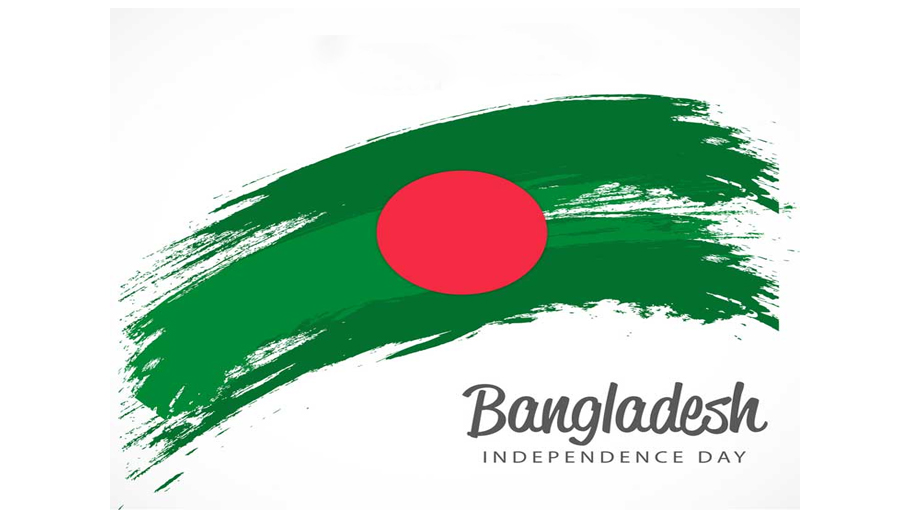A long walk to freedom

March 26 marks the Independence Day of Bangladesh. It is a red-letter day in the history of Bangladesh. Today we re-dedicate ourselves to the progress and prosperity of our nation; to the welfare of all our people; and today we salute our beloved bicolour flag.
On March 26, 1971 the independence of Bangladesh was declared and the Liberation War began. The people of the then East Pakistan took part in this war to liberate Bangladesh from the oppression of military leaders of Pakistan. Independence for Bangladesh was gained through a nine-month long people’s war against the Pakistani Army, which resulted in the loss of about 3 million lives. The freedom fighters, with military support from India, defeated the Pakistani Army on 16 December in the same year. Thus, Bangladesh came into being.
But the people of Bangladesh discovered their identity through the Language Movement in 1952. The struggle to establish their identity and national spirit began soon after 1947, when the British left India dividing it into two countries: India and Pakistan. Bangladesh, then East Pakistan, was part of Pakistan, which was put together by combining two geographically, culturally, and linguistically separate groups of people.
The people of Bangladesh soon realised that being a part of Pakistan, which was created on the two-nation theory, there was little scope for the distance culture of Bengalis to flourish. The Bangla language is the most important vehicle of the cultural expression for the people of this land. The refusal of the central government in West Pakistan to grant official status to the Bangla language became the focal point of struggle.
In the elections of December 7, 1970, the Awami League won 160 out of 162 seats in the-then East Pakistan and would have had a clear majority in the new assembly. Bangabandhu Sheikh Mujibur Rahman became the majority party leader of the Pakistan National Assembly.
The military rulers of Pakistan refused to allow the Awami League to form a government. A heinous conspiracy was plotted by the then Pakistani military dictator president Yahya Khan along with Pakistan’s People’s Party chief Zulfikar Ali Bhutto. Even though a conspiracy was being planned, General Yahya Khan was careful not to let this be known. A full-scale movement of non-cooperation with the military government began on early March, 1971. Thus, Bangladesh plunged into a gory war seeking its own birth.
The Pakistan Army began their genocide by attacking the innocent Bengalis of Dhaka city and then the whole land of Bangladesh with their sophisticated weapons. The dwellers of Dhaka city never confronted such unimaginable cruelty. The Pakistani army systematically massacred thee million Bengalis and unleashed a brutal war against us to prevent our shoot for independence.
But the brave people of this beloved land did not let the dream of encircled flag of red and green fall down to dust. During the nine months struggle which ensued an estimated three million Bengalis died and ten million refugees fled into India. Bangabandhu Sheikh Mujib was imprisoned in West Pakistan. A Bangladesh Government in exile was established. The Bengalis started smart and courageous guerrilla warfare. At one point, India also got involved in the war. The actual military campaign of India took place in December and lasted only ten days. The Indian Army launched a massive offensive against the Pakistani forces to support the Bangladesh movement. On December 16, 1971, the Pakistan army surrendered.
Every year the Government, different organisations and institutions take elaborate programmes to celebrate the day on a befitting manner. The national flag is hosted in all important offices, buildings, institutions and shops. All-important places are tastefully decorated. Meetings and seminars are held to explain the importance of the day.
On this day we pay rich tributes to the memory of the day. On this day we also pay rich tributes to the memory of the martyrs who laid down their lives for the sake of our independence. 52 years after the birth of the nation, many have forgotten the sacrifices of those who are no longer with us. But for those of us who survived, for our parents who kept us safe through the months of terror, there is no erasing the horrors of 1971.
Bangladeshhas yet to exorcise the demons of 1971. Many of the anti-Islamist-evil-reactionary and anti-liberation forces in the guise of humans who collaborated with the Pakistan army and murdered countless Bengalis have established their strong and wealthy positions in the soil of Bangladesh during 15 years of military dictatorial regimes. After 1991 national polls, their mango-twigs who ruled the country have further ravaged the country to destroy the unexpended spirits of our glorious Liberation War of 1971.
Today the secular Bangladesh that was born from the ashes of 1971 is under threat. It is under threat from the same forces that helped perpetrate the genocide of 1971. The future of a secular Bangladesh hangs in the balance today. In 1971, Bangladeshis learnt the evils of both racism and religious extremism. It is a lesson we should not forget at our own peril. Many of these griffins have yet to face justice for the irremissibly crimes they committed continuing at full strength or intensity.
This day reminds us of the supreme sacrifice of our freedom fighters who will ever shine in our hearts like the luminous stars in the sky. But at the same time, we must remember the spirit of the Liberation War. So, let all of us remember the spirit of the Independence Day and establish just laws in the country to build it as a country which rightly be called “Golden Bangladesh.”
Anwar A. Khan is an independent political analyst who writes on politics, political and human-centred figures, current and international affairs




